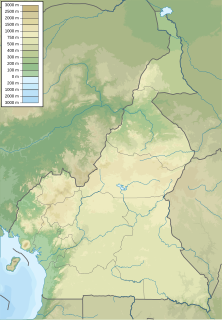 W
WThe Republic of Cameroon is a decentralized unitary state. Cameroon is ruled by a dictatorship.
 W
WAmbas Bay is a bay of southwest Cameroon.
 W
WThe Constitution of Cameroon is the supreme law of the Republic of Cameroon. Adopted in 1972, it is Cameroon's third constitution. The document consists of a preamble and 13 Parts, each divided into Articles. The Constitution outlines the rights guaranteed to Cameroonian citizens, the symbols and official institutions of the country, the structure and functions of government, the procedure by which the Constitution may be amended, and the process by which the provisions of the Constitution are to be implemented.
 W
WA Fon is a chieftain or king of a region of Cameroon, especially among the Widikum, Tikar, and Bamiléké peoples of the Bamenda grass fields and the Lebialem of the South West Region. Though once independent rulers, most Fons were brought under the German rule or military subjugation during the colonial period. Following the defeat of the Germans in World War I, the Fons came under British or French rule, depending on whether their territory fell into British Cameroon or French Cameroon. Since Cameroon's independence in 1961, the Fons are under the jurisdiction of the Government of Cameroon. However, they maintain semi-autonomous union councils and jurisdiction over their hereditary land.
 W
WMinister of Foreign Affairs of Cameroon is a government minister in charge of the Ministry of Foreign Affairs of Cameroon, responsible for conducting foreign relations of the country.
 W
WThis is a list of prime ministers of Cameroon since the country gained independence from France in 1960 to the present day.
 W
WThe Ministry of Finance of Cameroon is responsible for the public finance policies of Cameroon.
 W
WThe National Assembly is the lower house of the Parliament of Cameroon. It has 180 members, elected for five-year terms in 49 single and multi-seat constituencies. Together with the senate, it constitutes the legislative arm of government.
 W
WThe Vice President of Cameroon was a political position in Federal Republic of Cameroon. It was abolished in 1972 when the new constitution created unitary state United Republic of Cameroon. The Vice President of Cameroon was English-speaking and the President of Cameroon was French-speaking during the existence of the office.